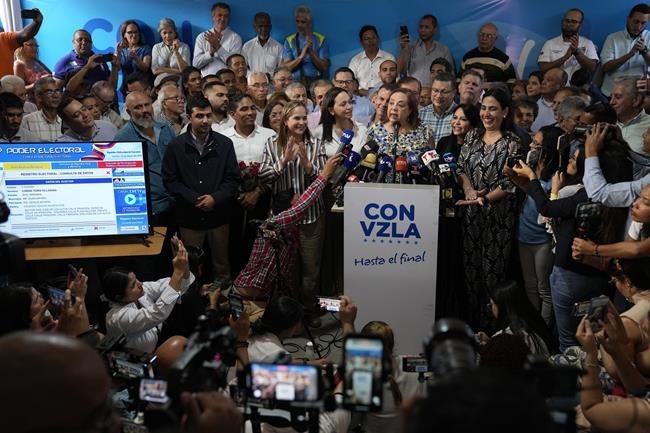CARACAS, Venezuela (AP) — Venezuelan opposition powerhouse María Corina Machado on Friday named a substitute to her presidential bid while she fights a government ban on her running for office.
The announcement comes as Machado faces increasing political repression from the government of President Nicolás Maduro as well as pressure from foreign leaders and fellow government opponents to abandon her candidacy.
Machado made the announcement two days after authorities arrested two of her campaign staffers and issued warrants for seven more, accusing them of links to an alleged anti-government plot.
She told reporters that college professor Corina Yoris will be registered as an opposition faction's presidential candidate ahead of a Monday deadline. The presidential election is set for July 28.
“Today is a great day and we have taken a big step, a great step, for the electoral victory in which we will defeat Nicolas Maduro,” Machado said from her campaign headquarters in Venezuela's capital, Caracas. She said Yoris is “a person with my full confidence, honorable, who will carry out this process with the support and trust of everyone.”
As of the announcement, Machado said, Yoris was not subject to a ban on running for office.
Machado, a former lawmaker, overwhelmingly won an October primary election organized by an opposition faction. But the governing party-loyal Supreme Tribunal of Justice in January affirmed a ban on her running for office, and fellow government critics pressed her to stand down to get behind an alternate candidate.
The primary of the United States-backed Unitary Platform coalition was organized by an independent commission without any assistance from Venezuela’s electoral authorities. Machado is not part of the coalition, but she was allowed to run as an independent.
Machado said Yoris will be registered as the candidate of both the Democratic Unity Table and A New Time parties.
“I am going to continue traveling throughout Venezuela, bringing strength and hope to every corner of the country,” Machado said. “We are in this together. We are a great team.”
Maduro's government moved to block Machado's candidacy from the start, announcing she was barred from running for office only a few days after she officially entered the primary race in June. After she won the primary, authorities issued arrest warrants for three of her staffers in connection to an alleged plot to sabotage a referendum the government held in December over a territorial dispute with Guyana.
Authorities did not arrest the staffers, but they took into custody Roberto Abdul, a longtime collaborator of Machado with whom she co-founded a pro-democracy group more than two decades ago.
She filed paperwork with the country’s top court in December alleging in part that her ban from office was null and void because she was never officially notified of the administrative decision. The following month, without ever holding a single hearing, the court reaffirmed the ban.
Authorities have continued to link her staffers to alleged anti-government plots. Wednesday's arrests bring to at least six the number of Machado staffers who are in custody over their alleged participation in the conspiracies the government claims to have foiled.
Standing next to Machado, Yoris said she felt “not only proud, but tremendously committed to the people, to the citizens, to María Corina.”
“So, thank you very much, especially for the trust that I see has been placed not only in me, but in the words and actions of María Corina," Yoris said. "We will continue fighting for her to achieve her authorization” to run in the election.
Political parties have until 10 days before the election to substitute candidates as long as electoral authorities approve it. But Machado has refused to say how she plans to overcome the ban against her. She has signaled though that she is counting on the international community pressuring Venezuela’s establishment ahead of the election, asking them for “more than well wishes” after her staffers arrests Wednesday.
Yoris, who has never held office, now faces the challenge of maintaining the enthusiasm that Machado managed to spark among opposition supporters and skeptics last year — a tall order with only four months left before the election in which Maduro is seeking six more years in office.
Polling suggests that Venezuelans overwhelmingly want to go to the polls and would trounce Maduro if given half a chance. And while Machado is their preferred candidate, a majority of opposition supporters wanted her to yield to someone else rather than have the opposition essentially sit out the race.
Maduro became interim president in March 2013 after the death of charismatic leader Hugo Chávez. He narrowly won election weeks later and was re-elected in 2018 in an electoral process widely criticized as fraudulent.
Opposition leaders and supporters had hoped this year's election would take place under a more level playing field thanks to an October agreement signed by representatives of Maduro and the Unitary Platform.
The deal, signed on the Caribbean island of Barbados and blessed by the U.S. government, called for the presidential election to take place in the second half of the year, extend invitations to international electoral observers and allow parties to choose their candidates so long as they comply with the law.
The agreement earned Maduro relief from some U.S. economic sanctions on the oil, gas and mining industries. But the U.S. government already reversed part of the relief over what it considers Maduro’s noncompliance with the agreement.
On Friday, White House national security spokesman John Kirby told reporters the Biden administration is “still willing to consider sanctions relief on the Maduro regime" but Wednesday's arrests "give us pause to think about how serious they are about meeting those commitments.”
___
Garcia Cano reported from Mexico City. Associated Press writer Christopher Megerian in Washington contributed to this report.
____
Follow AP’s coverage of Latin America and the Caribbean at https://apnews.com/hub/latin-america
Regina Garcia Cano And Jorge Rueda, The Associated Press



